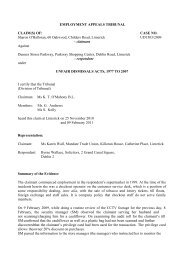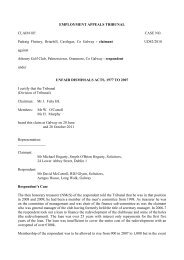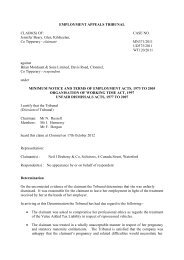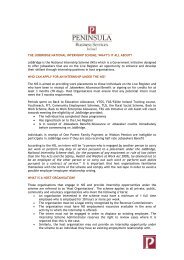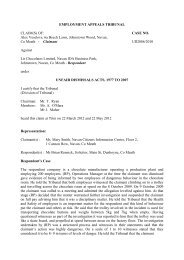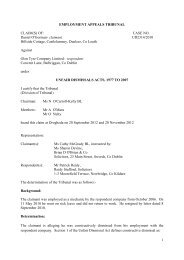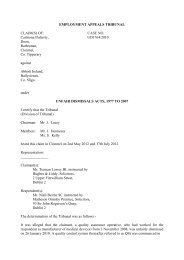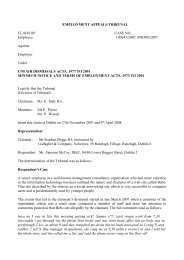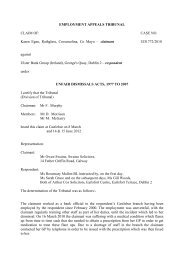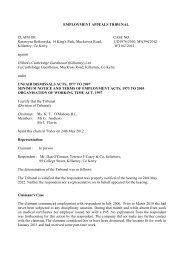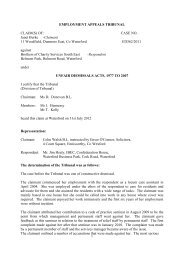Bennett v Bunzl Ireland Limited - The Peninsula Ireland Blog
Bennett v Bunzl Ireland Limited - The Peninsula Ireland Blog
Bennett v Bunzl Ireland Limited - The Peninsula Ireland Blog
Create successful ePaper yourself
Turn your PDF publications into a flip-book with our unique Google optimized e-Paper software.
EMPLOYMENT APPEALS TRIBUNAL<br />
CLAIMS OF:<br />
CASE NOS.<br />
Shane <strong>Bennett</strong> - claimant UD2409/2009<br />
51 Ballyglass, Ardnacrusha, Co. Clare RP2753/2009<br />
against<br />
<strong>Bunzl</strong> <strong>Ireland</strong> <strong>Limited</strong> – respondent<br />
Arthur Cox Building, Earlsfort Terrace, Dublin 2<br />
under<br />
UNFAIR DISMISSALS ACTS, 1977 TO 2007<br />
REDUNDANCY PAYMENTS ACTS, 1967 TO 2003<br />
I certify that the Tribunal<br />
(Division of Tribunal)<br />
Chairman:<br />
Members:<br />
Ms. K. T. O'Mahony B.L.<br />
Mr. G. Andrews<br />
Ms. H. Henry<br />
heard this claim at Ennis on 15 June and 28 September 2011<br />
Representation:<br />
Claimant:<br />
Respondent:<br />
Ms. Antoinette Simon BL instructed by Ms. Tina Hills of<br />
Brophy & Hills Solicitors, Abbey House, 7 Bank Place, Limerick<br />
Mr. Kevin Langford of Arthur Cox Solicitors,<br />
Earlsfort Centre, Earlsfort Terrace, Dublin 2<br />
<strong>The</strong> determination of the Tribunal is as follows:<br />
Summary of Evidence<br />
<strong>The</strong> respondent sells cleaning and safety products including personal protective equipment<br />
throughout the country. <strong>The</strong> claimant commenced employment with the respondent on 12<br />
February 2007 as a sales representative. When SD joined the respondent as its sales director in<br />
early 2008 it had a sales force of 18 operating in different geographic areas and by this time the<br />
claimant was a business development manager in Munster. SD’s first task was to restructure the<br />
business into 4 sectors (redistribution, health care, contract cleaning and industry). <strong>The</strong><br />
respondent advertised internally for four sector leaders to lead up the new sectors, drive the<br />
1
usiness and report to SD. <strong>The</strong> claimant did not apply. Following an interview process no<br />
appointment was made. On a reappraisal of its decision the respondent decided to appoint 2<br />
sector leaders in the industry division, one to cover the north & east of the country and another<br />
to cover the south & west of the country. <strong>The</strong> claimant successfully applied and in July 2008 he<br />
was promoted to the position of sector leader for the south & west, heading up a team of three.<br />
Business was difficult but the restructure was done to address that. However, by the end of the<br />
first quarter of 2009 the expected revenues did not materialise. Senior management decided that<br />
costs had to be cut to make the company more competitive and viable. A decision was taken to<br />
make seven positions in the industry sector redundant.<br />
SD invited the claimant to a meeting in Dublin on 11 June 2009 to discuss sales progress. When<br />
the claimant arrived SD and the HR manager were present in the room and SD informed the<br />
claimant that he was being made redundant and gave him a letter to this effect. This came as a<br />
major shock to the claimant. SD assured the claimant that the decision was an economic one,<br />
based on the need to cut costs, and was not performance related. SD had not given the claimant<br />
prior notice of the purpose of the meeting and there had not been any prior consultation because<br />
the decision had already been made. SD informed the claimant that a newly created position of<br />
key account manager was available and that all 7 staff members, being made redundant, had the<br />
option to apply for it. <strong>The</strong> claimant’s position was that: he had been called to the meeting under<br />
false pretences. When SD felt that the sector leader positions were not performing, he should<br />
have informed both of them of his concerns and given them the opportunity to respond. <strong>The</strong><br />
claimant maintained that other courses of action, such as pay cuts, ought to have been explored<br />
with the sales staff. <strong>The</strong> claimant also maintained that the job description for the position of key<br />
account manager was very similar to that of business development manager.<br />
<strong>The</strong> application process for the new position involved an interview and a presentation which<br />
took place on 16 June 2009, with less than 24 hours’ notice to the claimant. <strong>The</strong> managing<br />
director and SD conducted the interviews. Only the two sector leaders applied for the new<br />
position and both were unsuccessful. <strong>The</strong> claimant found that the interview was laboured and<br />
without any dynamic. <strong>The</strong> person appointed to the position came from a competitor company.<br />
<strong>The</strong> claimant appealed the decision. <strong>The</strong> appeal was not successful.<br />
<strong>The</strong> claimant sought written details as to why he had been unsuccessful in his application for<br />
the position of key account manager. SD wrote to the claimant on 23 June 2009, listing five<br />
essential requirements for the role. <strong>The</strong> respondent’s position was that while the claimant met<br />
three of these requirements he had not demonstrated ‘a proven track record’ in managing large<br />
PPE accounts or in winning and delivering large contracts, although he had some success in<br />
both fields. <strong>The</strong> claimant refuted this in his letter of response dated 23 June 2009, in which he<br />
set out his successes both in the employment and in a previous employment, acknowledging<br />
that there was some fall back but that was due to the downturn in the economy. As regards his<br />
ability to win large contracts he had introduced some good opportunities to the respondent but<br />
SD had put protocols in place for negotiating prices and the claimant could only negotiate<br />
within these rigid parameters. According to the claimant SD ignored his advice on what would<br />
be a competitive price for large orders and refused to lower the price, resulting in the loss of<br />
sales.<br />
<strong>The</strong> claimant accepted that sales had fallen and that action needed to be taken by the<br />
respondent. However, his position was that it made no sense for the respondent to get rid of its<br />
two sector leaders, who were its best salesmen. He could do all the tasks demanded of the role.<br />
2
<strong>The</strong>re had not been any suggestion that he needed further training.<br />
<strong>The</strong> claimant unsuccessfully appealed the decision to make him redundant. <strong>The</strong> appeal meeting<br />
had an air of inevitability about it and the claimant was not surprised that his appeal was<br />
unsuccessful.<br />
<strong>The</strong> respondent’s position was that the role of the sector leader is to manage and get the best out<br />
of the sales team whereas that of the key account manager, who has no direct reports, is to<br />
endeavour to maintain and build on the company’s presence in the market . <strong>The</strong> respondent<br />
made a quick decision because it did not want to draw out the procedure. <strong>The</strong> possibility of<br />
putting the claimant back into his old role of business development manager was not<br />
considered.<br />
Determination<br />
Initially the claimant sought alternative employment after being made redundant. <strong>The</strong><br />
employment situation was not optimistic so he has returned to full-time education.<br />
Trading in the industry sector suffered a serious downturn in 2008 and up to the relevant time in<br />
2009, compared to previous year or part thereof.<br />
<strong>The</strong> Tribunal is satisfied that a redundancy situation existed in the respondent company. <strong>The</strong><br />
respondent made the two positions of sector leader redundant. Accordingly, the provisions of<br />
section 6 (3) of the Unfair Dismissals Acts which applies to dismissals for redundancy where ‘the<br />
circumstances constituting the redundancy applied equally to one or more other employees in<br />
similar employment with the same employer who have not been dismissed’ have no application<br />
in this<br />
However, Subsection (7) of section 6 of the Unfair Dismissals Acts as amended provides:<br />
‘in determining if a dismissal is an unfair dismissal, regard may be had, if the rights<br />
commissioners, the Tribunal or the Circuit Court, as the case may be, considers it appropriate<br />
to do so—<br />
(a) to the reasonableness or otherwise of the conduct (whether by act or omission)<br />
of the employer in relation to the dismissal”.<br />
<strong>The</strong> two positions made redundant were positions which had been both created and to which the<br />
claimant and his colleague had been promoted less than one year before the redundancies. <strong>The</strong>y<br />
had been promoted from their former positions of business development managers and these<br />
positions still existed. <strong>The</strong> Tribunal considered the case of Thomas and Betts Manufacturing Ltd.<br />
V Harding [1980] IRIR 255 where the English Court of Appeal, upholding both the Industrial<br />
Tribunal and the Employment Appeals Tribunal held that the employee’s dismissal was<br />
unfairbecause she should have been offered alternative work as a packer (a position she had<br />
formerlyheld) even though this may have meant dismissing someone else. <strong>The</strong> two<br />
positions maderedundant were positions which had been both created and the claimant and<br />
his colleague hadbeen promoted to those positions less than one year before the<br />
redundancies. <strong>The</strong>y had beenpromoted from their former positions of business development<br />
3
managers and these positions stillexisted. Relying on the aforementioned case the Tribunal<br />
finds that in failing to consult theclaimant and explore the possibility of reverting him to his<br />
former position the respondent hadnot acted reasonably within the meaning of section.<br />
Accordingly, the dismissal is unfair and theclaim under the Unfair Dismissals Acts, 1977 to<br />
2007 succeeds. <strong>The</strong> Tribunal awards theclaimant the sum of €40,000.00 as compensation<br />
under the Unfair Dismissals Acts 1977 to 2007.<br />
<strong>The</strong> claim under the Redundancy Payments Acts, 1973 to 2007 is dismissed.<br />
Sealed with the Seal of the<br />
Employment Appeals Tribunal<br />
This ________________________<br />
(Sgd.) ________________________<br />
(CHAIRMAN)<br />
4


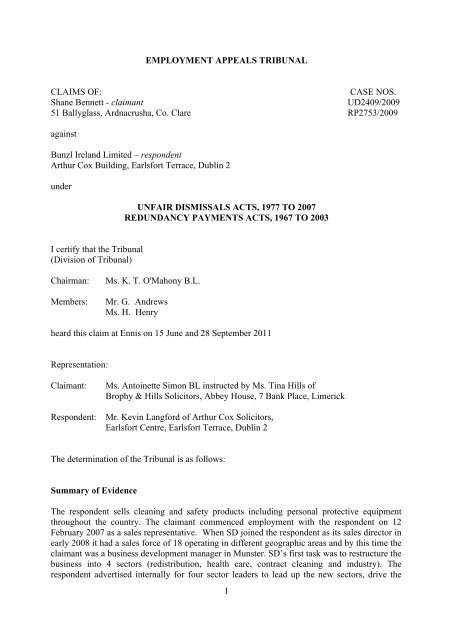
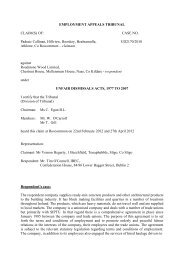
![Murtagh v Venair UD2029 [2009] - The Peninsula Ireland Blog](https://img.yumpu.com/44356256/1/184x260/murtagh-v-venair-ud2029-2009-the-peninsula-ireland-blog.jpg?quality=85)
